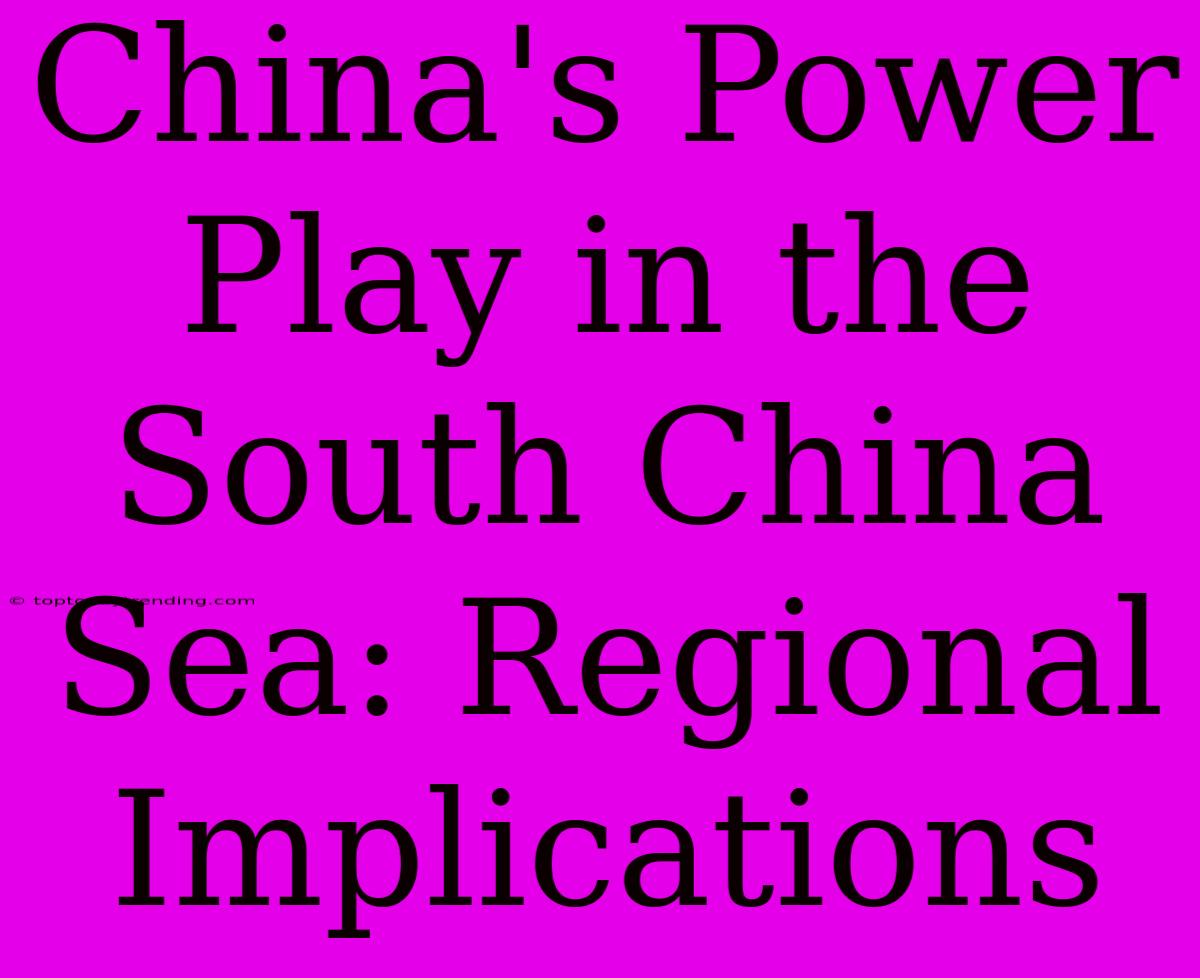China's Power Play in the South China Sea: Regional Implications
The South China Sea (SCS) has become a hotbed of geopolitical tension, largely due to China's assertive claims over the disputed waters. Beijing's actions, often perceived as a "power play," have triggered significant concerns across the region and beyond, raising questions about its impact on regional security and stability.
China's Claims and Actions: A Historical Perspective
China asserts its historical claim to nearly the entire SCS, including waters claimed by other Southeast Asian nations. This claim, based on the "nine-dash line" depicted on Chinese maps, encompasses areas rich in natural resources and strategically important shipping routes. While China maintains its claims are legitimate, other nations reject its historical basis, arguing it violates international law and undermines regional stability.
China's actions in the SCS have escalated in recent years, including:
- Construction of artificial islands: China has transformed reefs into militarized outposts, complete with airstrips and defensive facilities. These actions have raised serious concerns regarding China's intentions in the region.
- Deployment of military assets: China has been increasingly deploying warships, fighter jets, and other military assets to the SCS, demonstrating its growing military presence and projecting power.
- Harassment of foreign vessels: China has been accused of harassing and intimidating foreign vessels, including fishing boats and research vessels, operating within waters claimed by other nations.
Regional Implications: A Ripple Effect
China's actions in the SCS have far-reaching implications for the region, impacting relations between countries and potentially triggering regional conflicts.
Here are some of the key implications:
- Tensions with neighboring countries: The most direct impact is heightened tensions between China and its neighbors, including Vietnam, the Philippines, Malaysia, Brunei, and Taiwan. These countries, with overlapping claims in the SCS, have been increasingly vocal in their opposition to China's actions.
- Increased military spending: China's military build-up in the SCS has led to a regional arms race, with neighboring countries increasing their defense budgets and enhancing their military capabilities.
- Strategic competition with the United States: The United States, a major naval power with a significant interest in the SCS, has been increasingly vocal in its criticism of China's actions. This has escalated tensions between the two superpowers, leading to increased military deployments and strategic competition in the region.
- Disruption of maritime trade: The SCS is a vital waterway for global trade, hosting one-third of the world's maritime traffic. China's assertive actions have raised concerns about the potential for disruptions to maritime trade, with implications for global supply chains and economies.
- Regional instability and conflict: China's power play in the SCS has raised concerns about the potential for regional instability and conflict. This has prompted diplomatic efforts to address the disputes, but finding a lasting solution remains elusive.
Finding a Solution: Diplomacy and International Law
Despite the growing tensions, diplomatic efforts to find a peaceful solution to the SCS disputes continue. The Association of Southeast Asian Nations (ASEAN) has played a role in promoting dialogue, while the United States has maintained a presence in the region, promoting freedom of navigation and upholding international law.
Addressing the SCS disputes will require:
- A commitment to dialogue and negotiation: All parties involved need to engage in good-faith negotiations, seeking mutually acceptable solutions that respect international law.
- Respect for international law: China needs to respect international law, including the United Nations Convention on the Law of the Sea (UNCLOS), which governs maritime claims and activities.
- Transparency and accountability: All parties need to be transparent and accountable in their actions, avoiding unilateral actions that escalate tensions.
Conclusion: A Complex and Evolving Situation
The South China Sea remains a complex and volatile region, with China's power play continuing to shape the geopolitical landscape. While diplomacy and international law offer the best avenues for finding a peaceful resolution, the future of the SCS remains uncertain. The potential for escalation, along with the consequences for regional stability and global security, should be taken seriously by all parties involved.

